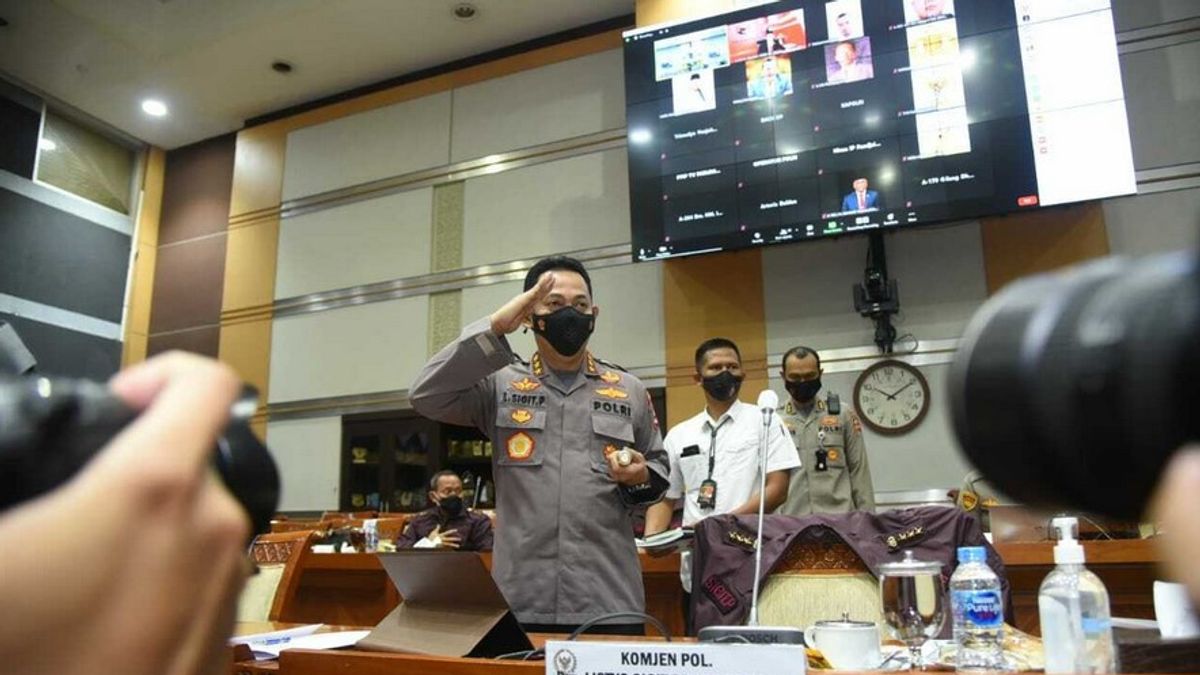JAKARTA - Komjen Listyo Sigit Prabowo underwent a fit and proper test as a candidate for the National Police Chief with Commission III of the Indonesian Parliament. During the due diligence, he delivered a new concept called Virtual Police.
According to him, the virtual police will be in charge of educational matters and involve influencers who have quite a number of followers. So, an officer will educate the public about social media activities that are good, cultured, and far from criminal acts or crimes.
At first glance, their duties and boundaries have little overlap with the cyber police. However, there are fundamental differences between the two. If the cyber police are tasked with enforcing laws in cyberspace, the virtual police will direct educational matters to the public.
"With virtual police, it is more aimed at educational matters, learning involves the community, seeing as influencers who have quite a lot of followers," said Listyo in front of Commission II of the DPR RI.
Other Countries' Virtual Police ModelVirtual police are nothing new in cyberspace. Several countries have implemented it first. And different countries have different ways and methods of realizing virtual police.
Meanwhile in Indonesia, only Tulungagung has implemented this program. So, to enrich the picture, the VOI team gathered from various sources how virtual police from other countries were.
Virtual Beijing Police - China
China launched the Virtual Beijing Police program in 2007. Like the officers on duty at the police station, officers will be on standby during their working hours on the official Beijing police website to receive complaints from the public.
Netizens can simply press the cartoon images of the two policemen that appear on the website if they want to report malicious information or pornographic sites. After that, netizens will be asked to fill out a form with the data needed so that the report can be processed.
"Later, the officer will contact the contact that has been included within 30 minutes after the report is made," said Zhao Hongzhi, Head of the Beijing Police Internet Department, reported by China Daily, Wednesday, January 20.
Virtual Police Station - India
In collaboration with the Commonwealth Human Rights Initiative (CHR (), the Rajasthan police have developed a Virtual Police Station (VPS), which allows the general public to “enter” virtually any police station.
The public can enter any available room in a 360 degree view. Later, the public can learn how the legal processes and procedures are carried out by officers every day.
In addition, users can more clearly observe the items available in the room. Examples include registration letters, evidence of crime, police equipment, telephones, and many more.
Due to this loss, the Indian government has implemented Virtual Police Stations in several provinces. Among others, Odisha Province, Delhi, and Andhra University.
Virtual Police Station - Brampton, Canada
In contrast to India, which implements VPS in the form of a website, the Brampton Police has chosen to use kiosks that are spread across several points.
Through these kiosks, the public has direct access to the police complaint number, which is 24-7. Later, the public can report various things they have seen or experienced-starting from property damage, complaints against motorists, cases of loss.
Launched last November, Virtual Police Station is a program of the Chief of Peel, Brampton Police, Nishan Duraiappah. According to him, virtual stations are a way to embrace technological innovation under his leadership.
Tulungagung Virtual Police
Before Komjen Listyo Sigit Prabowo presented his ideas in a fit and proper test, the Tulungagung Police had already launched a virtual police. Named Pos Digital Astuti, this service connects the public with the police without having to meet face to face.
To get information related to the police, the public simply needs to use a digital post which is located in a row of ATM machines at Golden Swalayan Tulungagung. By pressing the available button, the user will be automatically connected via video call with the duty officer.
"This is the first in Indonesia, the public can directly connect with our officers via video calls, and ask what information is needed," said Head of Tulungagung Police, AKBP Eva Guna Pandia as reported by Nusa Daily.
The English, Chinese, Japanese, Arabic, and French versions are automatically generated by the AI. So there may still be inaccuracies in translating, please always see Indonesian as our main language. (system supported by DigitalSiber.id)













